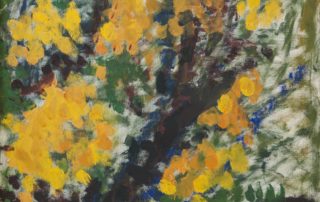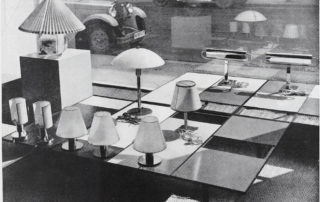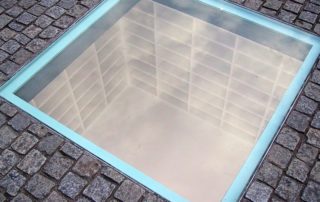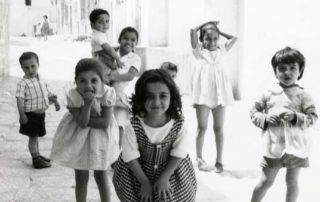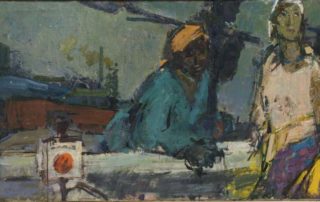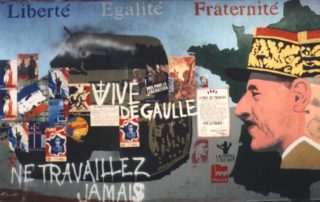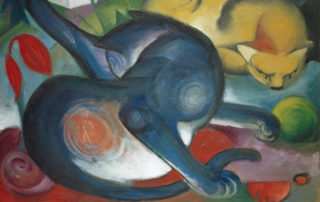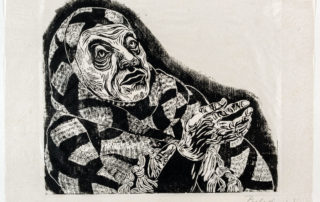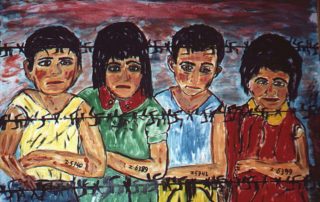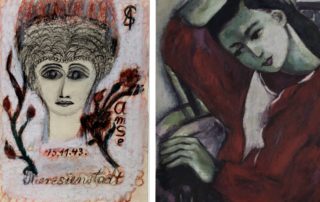Rachel Stern2023-04-03T09:59:19-04:00March 30th, 2023|Newsletter|
Spring is here! Let’s celebrate with Fritz Ascher’s blossoming Golden Chain. Just this past week, March 26, marked the 53rd anniversary of his death. Born in 1893 to Jewish parents in Berlin, Fritz Ascher (1893-1970) survived persecution by the German Nazi regime in hiding. Fritz Ascher, Golden Chain, ca 1959. Oil on canvas, 25.6 x 27.6 in. (65 x 70 cm). ©Bianca Stock Watch New York scholars Karen Wilkin and Elizabeth Berkowitz, PhD, discuss his post-1945 landscapes: WATCH THE RECORDING Dr. Eva Sabrina Atlan’s January 11 lecture in our virtual lecture series “Flight or Fight. stories of artists under repression” has found much interest. Today, we are excited to offer an English-language virtual [...]
Rachel Stern2023-05-03T14:36:21-04:00March 28th, 2023|Events, Lectures, Past Events|
Histories of Germany’s Bauhaus art and design school (1919–33) usually position it exclusively as a movement in exile as soon as the Nazis took power in 1933. In fact, the vast majority of its members remained and embraced Nazism, survived it, or became its victims. In this talk, art historian Elizabeth Otto scrutinizes traces of the work and lives of Bauhäusler who, through their imprisonment and often deaths in the concentration-camp system, have largely been lost to the history of the Bauhaus movement. Using archival sources—often scant materials preserved by family members and friends, including documents, photographs, and private memoirs—she reconstructs aspects of these artists’ work and lives and considers how to write the histories that Nazi violence has taken [...]
Rachel Stern2023-04-17T19:19:05-04:00March 6th, 2023|Events, Lectures, Past Events|
In honor of Yom HaShoah, this talk by Georgetown University professor Ori Z Soltes focuses on three Israeli and three American familiar and unfamiliar artists working in very diverse styles and not typically thought of as focusing on the Holocaust. Each of them, however, has offered powerful reflections on the defining catastrophe of the twentieth century. Barnett Newman, the foremost verbal spokesman for the chromatic side of the abstract expressionist movement redefining American painting in the early 1950s, offers an unexpectedly intense reflection on the question of theodicy. Mordecai Ardon, in the process of assuming leadership of the Bezalel school in Jerusalem at around the same time, balances between abstraction and figuration in depicting the Nazi-engendered chaos. Yigal Tumarkin’s [...]
Rachel Stern2023-02-23T08:11:27-05:00February 23rd, 2023|Newsletter|
Have we got exciting events for you! Hear about the influential British photographer Dorothy Bohm, now aged 98, from her daughter: Wednesday, March 1 12:00 pm EST / 17:00 Uhr GMT DOROTHY BOHM (B. 1924): A WORLD OBSERVED Lecture by Monica Bohm-Duchen ZOOM EVENT REGISTRATION Dorothy Bohm, Haifa, Israel, 1959. © Dorothy Bohm Archive London-based art historian Monica Bohm-Duchen will give her personal insights into the life and work of her mother, photographer Dorothy Bohm, who as a girl of fourteen found sanctuary from Nazi Europe in the UK, and in due course established herself as one of the leading figures in post-war British photography. Dorothy Bohm was born Dorothea Israelit [...]
Rachel Stern2023-03-15T14:04:18-04:00January 24th, 2023|Events, Lectures, Past Events|
The program features a talk by Lembersky’s granddaughter, Yelena Lembersky, co-author of the recent and highly acclaimed memoir, Like a Drop of Ink in a Downpour: Memories of Soviet Russia. Yelena will be introduced by Georgetown University professor, Ori Z Soltes, who has known her for many years and has written extensively on the work of Felix Lembersky. “We are merely honest people and see what is good and bad, and we cannot be confused.” – Felix Lembersky, Leningrad, the Soviet Union, 1960 Image above: Felix Lembersky, At the Train Station, ca 1960-64. © Felix Lembersky estate Felix Lembersky (1913-1970) was a Soviet Jewish painter, teacher, theater sets designer, and an organizer of artistic groups in Leningrad and [...]
Rachel Stern2023-02-15T19:21:41-05:00January 8th, 2023|Events, Lectures, Past Events|
Inspired by a visit to his birth country in the 1990s, American artist Philip Orenstein (b. 1938) created seven murals about the French complicity in the persecution of Jews in France during World War II. At that time, the French government had not admitted it had taken part in the persecution. The murals have been shown in various galleries and museums in the United States. In 1999, William Zimmer wrote in the New York Times, “Mr. Orenstein’s method involves combining poignancy with the determination that the viewers not miss the story. To this end, Mr. Orenstein skillfully, and wittily, employs the look of today’s splashy graffiti.” The works have not yet been shown in France. Born in Paris, France, in 1938, [...]
Rachel Stern2023-02-06T07:18:23-05:00January 8th, 2023|Events, Lectures, Past Events|
The Kunstmuseum Basel’s department of classic modernism houses one of the most prestigious collections of its kind. It was in fact assembled at a comparatively late date. In the summer of 1939 — shortly before the outbreak of World War II — Georg Schmidt (1896–1966), the museum’s director at the time, managed to acquire twenty-one avant-garde masterpieces all at once. The works were among those denounced in 1937 by Nazi cultural policy as “degenerate” and forcibly removed from German museums. The Third Reich’s Ministry of Propaganda correctly assumed that a portion of such works would find buyers abroad and bring in foreign currency. In this way certain artworks deemed “internationally exploitable” reached the art market via various channels. [...]
Rachel Stern2023-03-30T06:59:22-04:00December 14th, 2022|Events, Lectures, Past Events|
The artistic work of Maria Luiko (1904-1941), born Marie Luise Kohn in Munich, is characterized by an impressive diversity. In addition to drawings, watercolors and oil paintings, she created prints using various printing processes and paper cuts, and designed book illustrations, stage sets and marionettes. Already during her studies at the local Academy of Fine Arts and her training at the School of Applied Arts she was included in exhibitions in the Munich Glass Palace (Münchner Glaspalast). Her career was brutally cut short by the Nazi regime. As a Jew, Luiko was not able to join the Reich Chamber of Fine Arts (Reichskammer der bildenden Künste), a Nazi organization founded in 1933. Without membership, she could not obtain work materials, [...]
Rachel Stern2023-03-20T06:43:11-04:00December 11th, 2022|Events, Lectures, Past Events|
Dorothy Bohm was born Dorothea Israelit in Königsberg, East Prussia (now Kaliningrad, Russia) in 1924 into an assimilated, affluent and cultured Jewish milieu. In 1932 her father chose to move the family to Memel (now Klaipeda) in Lithuania, but following the Nazi occupation of Memelland in March 1939, her parents decided to send their daughter, aged 14, to the safety of England, where she arrived in June 1939. She wasn’t to see her parents and sister again for over twenty years. Image above (appears as detail): Dorothy Bohm, Venice Carnival, 1987 © Dorothy Bohm Archive Dorothy Bohm, Self-Portrait, 1942, age 18. © Dorothy Bohm Archive Dorothy Bohm, Ascona, 1948. © Dorothy Bohm Archive [...]
Rachel Stern2023-02-01T06:15:59-05:00December 1st, 2022|Events, Lectures, Past Events|
In honor of UN Holocaust Remembrance Day, Hilary Helstein, director of the award-winning documentary "As Seen Through These Eyes" spoke with Rachel Stern, director and CEO of the Fritz Ascher Society New York, about the making of her documentary. As poet Maya Angelou narrates this powerful documentary, she reveals the story of a brave group of people who fought Hitler with the only weapons they had: charcoal, pencil stubs, shreds of paper and memories etched in their minds. These artists took their fate into their own hands to make a compelling statement about the human spirit, enduring against unimaginable odds. Featuring interviews with Simon Wiesenthal as he talks about his art, never before appearing in a film, [...]
Rachel Stern2022-11-24T05:24:57-05:00November 10th, 2022|Events, Past Events|
In the aftermath of the Holocaust, the unprecedented destruction and plight of survivors prompts the unthinkable - German and Jewish leaders meet in secret to grapple with the first reparations in history, resulting in the groundbreaking Luxembourg Agreements of 1952. Screening followed by Q+A with Gideon Taylor and Karen Heilig, from the Conference on Jewish Material Claims Against Germany. Watch the Trailer: SCREENINGS In the aftermath of the Holocaust, German and Jewish leaders met in secret to negotiate the unthinkable – compensation for the survivors of the largest mass genocide in history. Survivors were in urgent need of help, but how could reparations be determined for the unprecedented destruction [...]
Rachel Stern2023-02-26T09:25:37-05:00November 7th, 2022|Events, Lectures, Past Events|
Erna Pinner, Rosy Lilienfeld, Amalie Seckbach, and Ruth Cahn were among the first women artists in Frankfurt to enjoy professional success. Throughout the Roaring Twenties, these four Jewish women left their mark on Frankfurt’s art scene, published and exhibited internationally, cultivated a cosmopolitan lifestyle, and competed with their male colleagues. When the National Socialists seized power, their careers came to an abrupt end. From then on, they were persecuted as Jews and their works ostracized; later, after the end of World War II, they were largely forgotten. Now, “Back into the Light” is at long last bringing them back to the public eye. The departure point is an article by art historian Sascha Schwabacher, published May 1935 [...]


